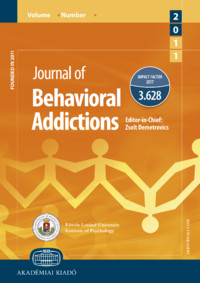Gambling disorder is associated with reduced sensitivity to expected value during risky choice
Gambling disorder is associated with reduced sensitivity to expected value during risky choice
Author(s): Eve H. Limbrick-Oldfield, Mariya V. Cherkasova, Dawn Kennedy, Caylee-Britt Goshko, Dale Griffin, Jason J.S. Barton, Luke ClarkSubject(s): Behaviorism
Published by: Akadémiai Kiadó
Keywords: decision-making; expected value; gambling disorder; gambling
Summary/Abstract: Background and aims. Individuals with gambling disorder display increased levels of risk-taking, but it is not known if it is associated with an altered subjective valuation of gains and/or losses, perception of their probabilities, or integration of these sources of information into expected value. Methods. Participants with gambling disorder (n = 48) were compared with a healthy comparison group (n = 35) on a two-choice lottery task that involved either gains-only or losses-only gambles. On each trial, two lotteries were displayed, showing the associated probability and magnitude of the possible outcome for each. On each trial, participants chose one of the two lotteries, and the outcome was revealed. Results. Choice behaviour was highly sensitive to the expected value of the two gambles in both the gain and loss domains. This sensitivity to expected value was attenuated in the group with gambling disorder. The group with gambling disorder used both probability and magnitude information less, and this impairment was greater for probability information. By contrast, they used prior feedback (win vs loss) to inform their next choice, despite the independence of each trial. Within the gambling disorder group, problem gambling severity and trait gambling-related cognitions independently predicted reduced sensitivity to expected value. The majority of observed effects were consistent across both gain and loss domains. Discussion and Conclusions. Our results provide a thorough characterization of decision processes in gain and loss domains in gambling disorder, and place these problems in the context of theoretical constructs from behavioural economics.
Journal: Journal of Behavioral Addictions
- Issue Year: 9/2020
- Issue No: 4
- Page Range: 1044-1055
- Page Count: 12
- Language: English

